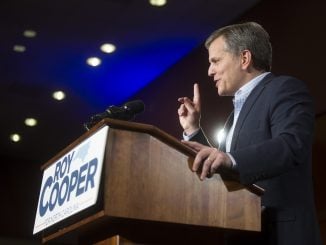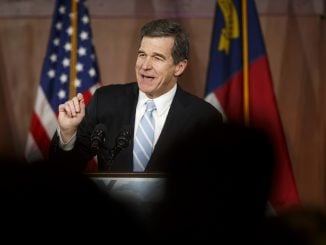RALEIGH — Gov. Roy Cooper said on Wednesday that he’s preparing to accept for the state extended unemployment benefits that President Donald Trump directed in an executive order, part of the continuing response to the COVID-19 economic downturn.
Cooper, a Democrat, told top Republican legislators of his plan the day after the GOP leaders asked him to act quickly to ensure North Carolina workers can get an additional maximum weekly benefit of at least $300.
Cooper said his administration has started the application to receive the payments, which are coming from federal disaster relief dollars. House Speaker Tim Moore and Senate leader Phil Berger said Tuesday they are prepared to authorize the state’s share of the costs when the General Assembly reconvenes in September.
Last weekend’s executive action came about as congressional Democrats and the Trump administration failed to reach a deal using traditional sources to replace $600-per-week federal pandemic payments that ended July 31.
Cooper blasted state Republicans for the overhaul of state benefits they approved years ago as the system faced a billion-dollar shortfall.
“Let me be clear. I refuse to let North Carolinians suffer because Congress and the president have been unable to get the job done and you have failed to help the unemployed,” Cooper wrote to Berger and Moore. A day earlier, Berger and Moore criticized Cooper because his office questioned spending disaster relief dollars on the benefits.
Cooper called on Congress and Trump to negotiate the reinstatement of the $600-per-week federal supplement. He also wants the GOP-controlled legislature to raise the weekly state benefit maximum from $350 per week to at least $500 and double the current 12-week state benefit period when it returns to Raleigh.
Berger spokesperson Pat Ryan suggested late Wednesday that Cooper’s demand for even higher benefits could cause a standoff in Raleigh that will lead to no extended benefits.
The governor “should focus on getting the federal supplement out the door instead of finding ways to avoid giving President Trump a win,” Ryan said in an emailed statement.
Trump’s executive order requires the state to pay an amount equal to $100 per week per beneficiary in order to obtain the $300 in federal benefits.
The federal government’s guidance gives the states two options. They can provide an additional $100 in state benefits per recipient as the match, raising the total extended pandemic benefit to $400 per week. Or states can count existing state benefits toward their match, meaning the overall extra benefit could be $300 a week.
Cooper’s letter seems to suggest the $400 option. He asked legislators to direct the matching amount be paid from the state’s unemployment benefit reserve fund, which currently has close to $3 billion.
The 2013 state unemployment overhaul helped eliminate debt owed to the federal government for benefits during the Great Recession. The state’s benefit reserve was up again to nearly $4 billion when a wave of job losses began in March.
The state Division of Employment Security says more than 1.2 million people have applied for benefits during the pandemic, with nearly $6.9 billion in federal and state benefits distributed so far.



